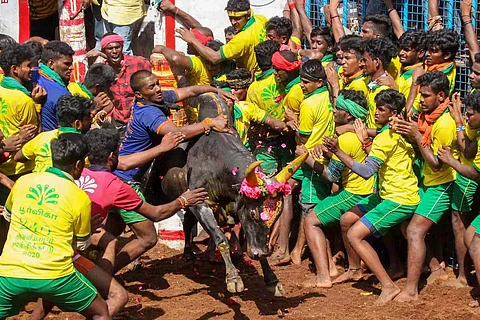

The Tamil Nadu government has told the Supreme Court that the bull-taming sport ‘jallikattu’ is a religious and cultural festival that bears a religious significance to the people of the state and does not violate the provisions of the Prevention of Cruelty to Animals (PCA) Act, 1960. In a written submission filed in the apex court, the state government has said that jallikattu was not merely an act of entertainment or amusement but an event with great ‘historic, cultural and religious value’. Jallikattu, also known as ‘eruthazhuvuthal’, is a bull-taming sport played in the southern state as part of the Pongal harvest festival.
The state has told the apex court that the bulls involved in jallikattu are treated with great care throughout their lifespan and no harm is ever allowed to be caused to the animals till the very end of their lives. "Jallikattu is a religious and cultural festival /sporting event which bears a religious significance to the people of Tamil Nadu. Each and every event of jallikattu is conducted during the Pongal festival as thanksgiving for a good harvest and subsequent festivals are conducted in temples," read the written submission filed by the state before a five-judge Constitution bench headed by Justice KM Joseph.
The bench, also comprising justices Ajay Rastogi, Aniruddha Bose, Hrishikesh Roy and CT Ravikumar, commenced hearing arguments on a batch of pleas challenging two Tamil Nadu and Maharashtra laws allowing jallikattu and bullock-cart races.
In its written submissions, Tamil Nadu has said that jallikattu has great cultural and spiritual significance and is given prime prominence even in the school curriculum. "The basic rules of jallikattu do not permit the bull to be tamed /restrained by using any instruments like sticks, ropes or knives and do not permit the participants to hold any other part of the bull except the hump," it said. The written submissions said the bull is required to run only for a very short distance of 15 metres.
"Jallikattu does not violate the principles of compassion and humanism nor does it violate the provisions of the PCA Act," the state government said, adding, "Jallikattu has nothing to do with 'speciesism' or discrimination against animals. In fact, both the people who rear the bulls and those who participate in the event regard the bull as a precious and prestigious asset and respect the bulls."
The state further said, "The people of Tamil Nadu have a right to preserve their traditions and culture. Cultural heritage being an intangible practice needs to be safeguarded. If needed, a cultural practice can be reformed, but only by taking the stakeholders into confidence."
The state has said it is not a fact that conducting jallikattu permits and perpetuates cruelty to animals. "In fact, with the passing of the Amended Act, jallikattu events are conducted without cruelty to the animals," it said.
"It is submitted that in the name of prevention of cruelty, the courts ought not to impose absolute bans on jallikattu. Animals do not have a fundamental right under Article 21 (of the Constitution) and the earlier judgments egregiously erred in directing a ban on jallikattu based on the finding that animals had such a right," the state has said.
On the other hand, some of the petitioners, who have challenged a Tamil Nadu law allowing jallikattu, argued that perpetuating cruelty cannot be permitted and one cannot have a provision that is destructive of the purpose of a legislation like the Prevention of Cruelty to Animals Act. “Bull-taming sport "jallikattu" leads to injuries and even fatalities of animals as well as humans and something that involves cruelty cannot be allowed. There are human fatalities also and year after year, there are reports to that effect that the number of injuries caused both to animals and humans has risen," they said and added that when someone is inducing fear among animals, it is inherently cruel.
The arguments are to continue on November 29.
The Constitution bench is considering five questions referred to it by a two-judge bench of the apex court in February 2018. Referring the issue to the five-judge bench, the apex court had said in 2018 that the petitions challenging the Prevention of Cruelty to Animals (Tamil Nadu Amendment) Act, 2017 need to be decided by a larger bench since those involve substantial questions relating to the interpretation of the Constitution.
Framing the questions for the larger bench, the top court had said it needs to be tested if the Amendment Act "perpetuates cruelty to animals" and "can it, therefore, be said to be a measure of prevention of cruelty to animals". It had asked, "Is it colourable legislation which does not relate to any entry in the State List or Entry 17 of the Concurrent List?" The two-judge bench had also framed a question for the larger bench as to whether the Amendment Act was directly contrary to the apex court's earlier judgement in the "jallikattu" matter and whether the defects pointed out in the two verdicts "could be said to have been overcome by the Tamil Nadu legislature by enacting the impugned Tamil Nadu Amendment Act".
Tamil Nadu had amended the central law -- the Prevention of Cruelty to Animals Act, 1960 -- and allowed jallikattu in the state. The state law has been challenged in the Supreme Court.
The apex court had earlier dismissed the Tamil Nadu government's plea seeking a review of its 2014 judgement banning the use of bulls for jallikattu events in the state and bullock-cart races across the country. The court had, in its 2014 judgement, said bulls cannot be used as performing animals either for jallikattu events or bullock-cart races, and banned their use for these purposes across the country.